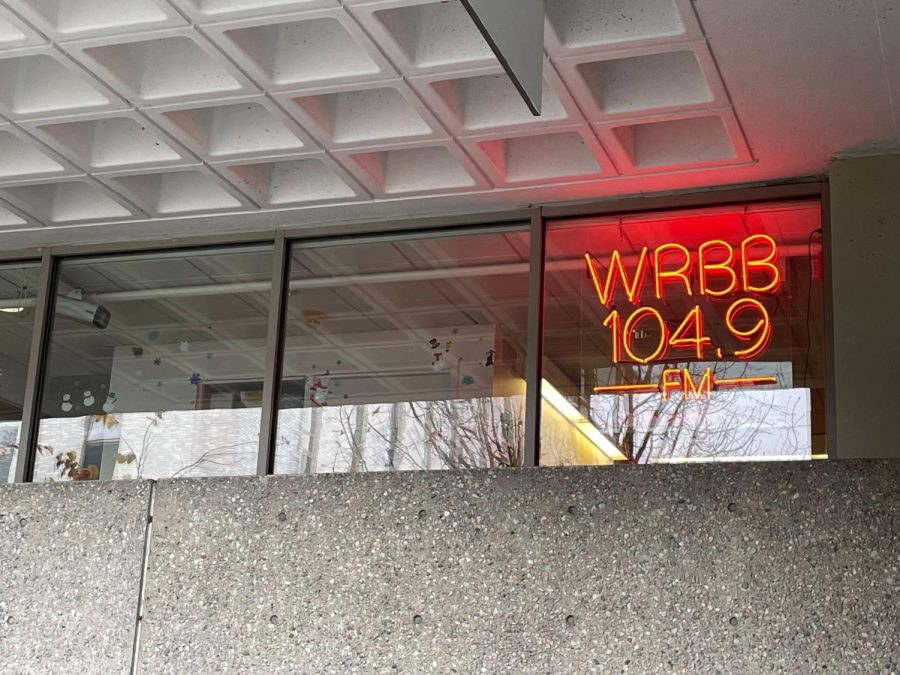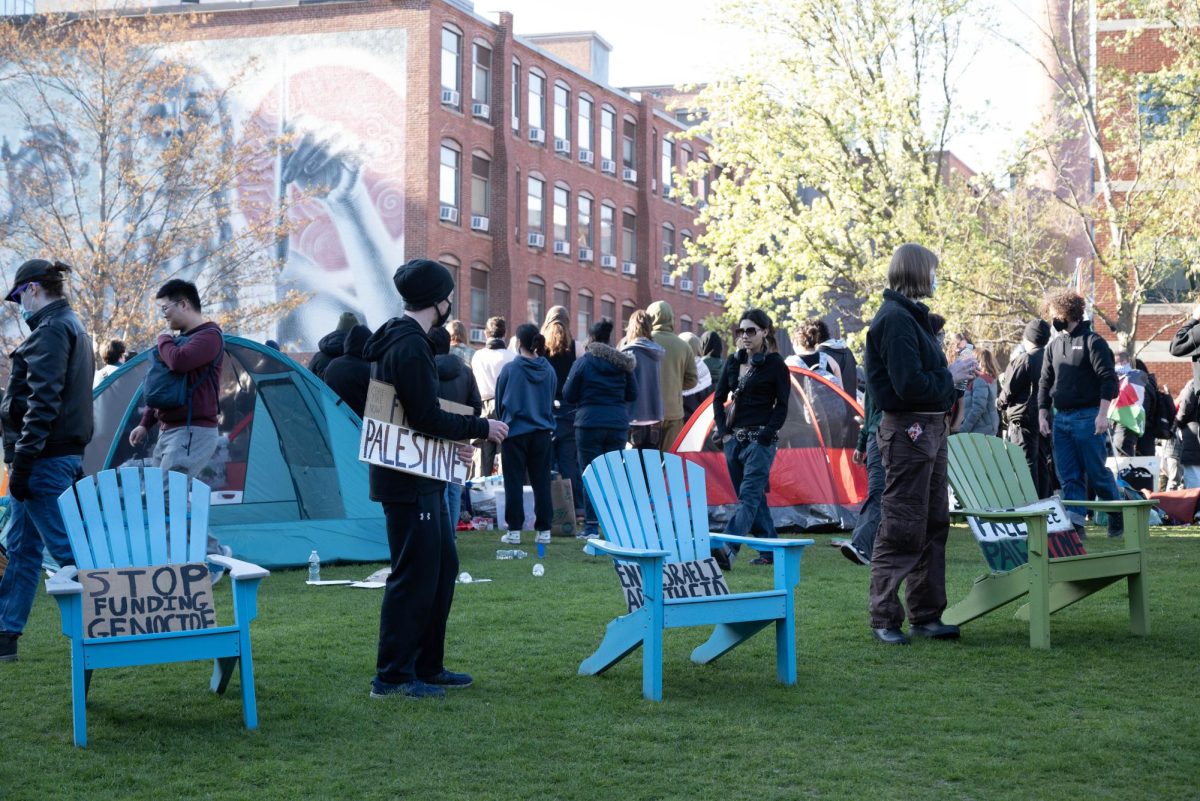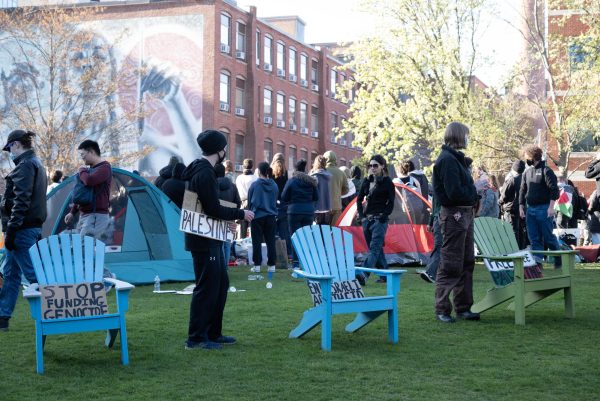WRBB student DJs persevere despite small audience
WRBB is Northeastern’s student radio station.
December 8, 2021
The student DJs at WRBB, Northeastern’s campus radio station, work tirelessly to keep the station running 24/7. Despite all of their hard work, they can’t seem to rack up more than 30 listeners on any given show.
Still, a small audience doesn’t deter them.
Northeastern’s student DJs are here to have fun. Rather than focusing on arbitrary numbers, WRBB’s primary mission is to create positive experiences for participants while producing high-quality content for listeners, regardless of how many there are. WRBB hopes to become a better-known campus organization so more Huskies can join the small community.
“We’re really focused on making WRBB as freeform as possible, which means we don’t push our DJs to up their listener counts or anything. Especially because we’re a non-profit station, listener counts aren’t really something that matters to us that much as long as DJs are having a good time and getting something out of it,” said program director Maya Mudgal.
Founded in 1962, WRBB has long hosted a variety of shows including, the 1986 Northeastern alum and famous talk show host Wendy Williams’ “Soul’s Place.” These days, WRBB hosts 102 different shows run by 134 student DJs in addition to 12 community DJs. The shows tend to have specific themes, such as “Telemachus and the Boys,” which plays music to match a given chapter of the Iliad at 8 p.m. every Monday. “Porpoises LIVE!,” on the other hand, follows a unique theme, or purpose, each week.
“[Porpoises LIVE!] started pretty simple. We had [a show] for cleaning your room, for eating brunch, then also they get kinda crazy, like music for the purpose of floating through space or running from zombies,” said first-year computer science major Archie O’Connell, known as DJ Usacoaster on Tuesday afternoons.
O’Connell has found hosting a show to be both a learning and bonding experience with his fellow DJs, Sophia Campione and Finn McCormack, or DJ Ballzella and Finn MC, respectively.
“We all have very distinct and separate music tastes, so every time, every playlist, I’m finding completely new music,” O’Connell said.
For Mudgal, this is ideal.
“I’d like to create a really nice, supportive community on campus for all of our DJs and our listeners,” said Mudgal, a fourth-year combined biology and political science major.
Mudgal is the liaison between WRBB and its DJs. In addition to mediation, she is responsible for managing the Federal Communications Commission, or FCC, guidelines, working closely with fourth-year journalism major and sports director Sarah Olender, and handling the station’s extensive schedule.
“I take in all of the show request forms and build a schedule of that because we broadcast almost 24 hours a day, seven days a week,” Mudgal said.
For DJs, some time slots are better than others. For example, according to FCC rules, DJs are only allowed to play explicit music from 10 p.m. to 6 a.m. So for some DJs, some of the most coveted spots are late at night. A show’s time slot also determines its listenership.
“Noon on a weekday is a little tough because most people are in classes or at work, but some of our nighttime slots get really good at advertising themselves and get pretty decent listenership — I’d say the high teens to twenties,” Mudgal said.
These numbers are not exact. WRBB is available via FM radio, Apple Music and their website. The program they use, Icecast, only tells them how many people listen on the website. DJs use personal social media accounts to bolster their audience.
“One thing that helps is that a lot of our DJs have Instagrams for their shows so they can share with their friends when they’re broadcasting and bump their listenership,” Mudgal said.
O’Connell, who averages 12 to 15 listeners per show, said he is content with these numbers.
“It’s radio in 2021.We’re never really gonna get that many listeners. We could very well be the least listened to show on the station because we’re new and unestablished, and I’m fine with that,” O’Connell said. “It’s just a blast knowing that more people than each of our moms are tuning in.”
Some shows have turned to social media advertising to grab the attention of students. But to many, WRBB remains unheard of. Lon Pierson, a first-year combined data science and math major, knows very little information about the station.
“I know it’s our campus radio station but I don’t really know anything else about it. I don’t know how to listen. I really just listen to my own playlists on Spotify,” Pierson said.
WRBB hopes to foster a larger community than what they already have, both inside and outside the booth.
“One thing about radio is that you go in for your own time slot and then you leave. There’s not a lot of overlap between other people but we really want to create a community,” Mudgal said.
Looking to the future, WRBB is more focused on community awareness and involvement rather than listenership.
“My main goal is just to make sure that more people at school know about us. We’re a really old student group on campus and we have a ton of really interesting history and I’d love to share that with more people,” Mudgal said.
Students currently involved said joining WRBB is a worthwhile decision that will only enrich someone’s time at Northeastern.
“Once you start it, it’s just such a fun, exciting experience, there’s just no point stopping it,” O’Connell said. “I think college radio is one of the best experiences that can be offered.”


















